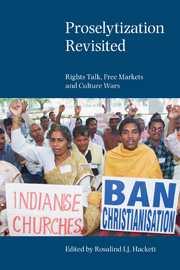Book contents
- Frontmatter
- Contents
- Preface and acknowledgements
- Contributors
- Revisiting Proselytization in the Context of Rights Talk, Free Markets and Culture Wars
- Section I
- Section II
- Section III
- Section IV
- Section V
- Proselytization or Information? Wicca and Internet
- You Can't Talk to an Empty Stomach: Faith-based Activism, Holistic Evangelism, and the Publicity of Evangelical Engagement
- Proselytization: Closing Thoughts from a Sociologist
- Index
You Can't Talk to an Empty Stomach: Faith-based Activism, Holistic Evangelism, and the Publicity of Evangelical Engagement
from Section V
- Frontmatter
- Contents
- Preface and acknowledgements
- Contributors
- Revisiting Proselytization in the Context of Rights Talk, Free Markets and Culture Wars
- Section I
- Section II
- Section III
- Section IV
- Section V
- Proselytization or Information? Wicca and Internet
- You Can't Talk to an Empty Stomach: Faith-based Activism, Holistic Evangelism, and the Publicity of Evangelical Engagement
- Proselytization: Closing Thoughts from a Sociologist
- Index
Summary
The political currency of faith-based welfare activism reflects remarkable cultural trends in American evangelicalism in recent decades, particularly with regard to how evangelical activists approach the issue of proselytism. In addition to major gains in congregational growth, political influence, and media exposure, contemporary born-again evangelicals enjoy high levels of socioeconomic and educational mobility. At least one outcome of this trend is a growing concern to practice evangelism in ways that conform to prevailing middle-class norms of social respectability and tact. Many evangelicals are sensitive to the fact that non-evangelicals view some of the most common forms of proselytizing —such as door-to-door witnessing (or “visitation evangelism”) —with ridicule and scorn. They are conscious of negative stereotypes that portray their efforts to “save souls” as intolerant, naïve, and manipulative, even predatory. Although the provocative and impersonal methods of “spreading the gospel” that have long fueled such stereotypes continue to exist, modern evangelicals are increasingly moving toward new styles of evangelism that stress the importance of interpersonal relationships predicated on reciprocity, compassion, and trust. In this light, it is easy to see why evangelicals in the post-welfare era have hailed the discourse of “faith-based initiatives” as a golden opportunity to advance the cause of Christian evangelism. Such initiatives (federal, state, and local) are viewed by many evangelicals as consistent with their key moral and theological tenets, and perhaps more importantly, they are seen as paving the way for proselytic practices that are holistic, philanthropic, and deemed socially acceptable.
- Type
- Chapter
- Information
- Proselytization RevisitedRights Talk, Free Markets and Culture Wars, pp. 431 - 454Publisher: Acumen PublishingPrint publication year: 2008



